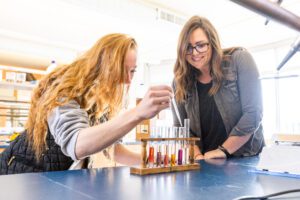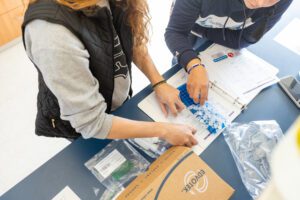Being one of the few “general” forensic science programs west of the Mississippi, University of Providence’s (UP’s) Forensic Science Program offers a unique take in curriculum. The Bachelor of Science in Forensic Science Degree focuses on the fundamentals of biology, chemistry, physics, and mathematics.
With 25 students in the program, UP’s forensic science major provides students with hands-on and experiential learning opportunities, such as: visiting Montana’s State Crime Lab, connecting with Great Falls Police Department’s internships, and observing/participating in sexual assault interviews at Benefis Health System.
A holistic and robust range of topics are covered within UP’s Forensic Science Major, including fingerprint analysis, DNA analysis, serology, blood spatter analysis, and evidence and lab analysis of hair, glass, soils, skeletal analysis, drugs, poisons, and more.
University of Providence’s Forensic Science Major & Concentrations
As a forensic science major at UP, you will have the opportunity to dive right into your major and select between three concentrations — three areas of focus within the forensic science major:
Forensic Sciences
The forensic sciences concentration is the perfect track for students who would like to focus on becoming crime scene investigators, applying to law school or graduate school, or working outside of a laboratory field mandating extensive chemistry or biology backgrounds (e.g., forensic anthropology, or fingerprint analysis).

Forensic Biology
The forensic biology concentration is the second most popular pathway and is the ideal path for students who plan to work in laboratory environments specializing in biology issues. Usually, this concentration consists of students who are pre-med and plan to take the forensic pathology route doing autopsies or becoming DNA analysts for state crime labs.
Forensic Chemistry
The forensic chemistry concentration focuses on dealing with chemistry issues and is the route for students who plan on working in laboratory environments and are comfortable handling lab instruments and chemicals. This concentration is also ideal for students interested in toxicology – running analyses of biological samples for the presence of toxins (e.g., drugs and DUI blood samples).
The bachelor’s degree in forensic science is designed to prepare students with a strong scientific background and provides a compilation of all the hard-core sciences, including the academic fields of chemistry, biology, physics, geology, and mathematics.
All these academic studies provide students with the knowledge and skills necessary in solving crimes based on the evidence left behind at a crime scene.
Who is this program ideal for?
The forensic science program is ideal for students who are interested and enjoy all aspects of math and science. Depending on a student’s interest and professional path, forensic science majors have a passion for either forensic investigation, interpreting scientific information, handling lab instruments and chemicals, and/or conducting research.
Students in this academic profession also enjoy focusing on the main elements of criminalists (i.e., analysis of blood, fibers, glass, paint, souls, hair, etc.) and the fields of toxicology (i.e., DNA analysis serology, forensic anthropology, human pathology, and numerous other areas dedicated to the scientific study of evidence).
What skills will I learn as a forensic science major?
Students will be able to apply scientific principles to matters defined by civil and criminal law. Students will learn to recognize, identify, individualize, and evaluate physical evidence from a rigorous academic curriculum.
Skills You Will Learn
- Work effectively in groups and collaborate in team investigations
- Interpret scientific information accurately, drawing logical conclusions
- Interpret laboratory data accurately & draw logical conclusions

- Practice analytical laboratory skills
- Critique scientific literature thoroughly & distinguish between credible and non-credible scientific information. Analyze the experiments of other scientists.
- Integrate fundamental scientific knowledge in the solution of scientific and criminal problems, making use of crime scene investigation techniques, evidence collection and preservation methods, and proper techniques of data gathering and analysis
- Research project development
- Blood spatter analysis
- Crime scene processing
- Proper evidence handling
- Chain of custody
- Identification and processing of impressions evidence, patterned evidence, blood, body fluid, & DNA
With these skills and competencies, students are prepared to work either as a crime scene investigator, in a laboratory environment, or continue their education at the graduate school level.
Career Opportunities
When you think of a forensic science degree, the first career that comes to mind is the forensic scientist role. However, there are plethora of career opportunities that stem off a forensic science degree, such as:
- Crime Scene Investigator (for Crime Lab or police department)
- Specialty Analyst for a state lab or private lab
- FBI Investigator, Evidence Technician
- Forensic Biologist
- Forensic Chemist/Toxicologist
- Forensic Psychologist
- Arson Investigator
Career opportunities in the scope of forensic science are so vast and almost limitless, so students can find the right fit in the industry of forensic science.
Interested in forensic science as a major?
Review our forensic science program and start your academic career with University of Providence today!
